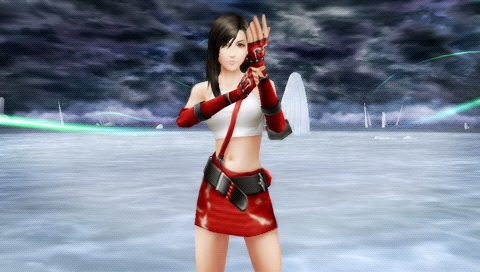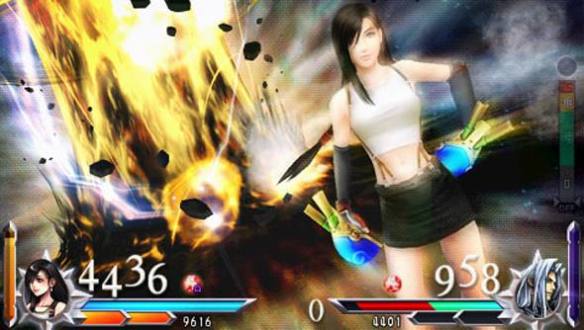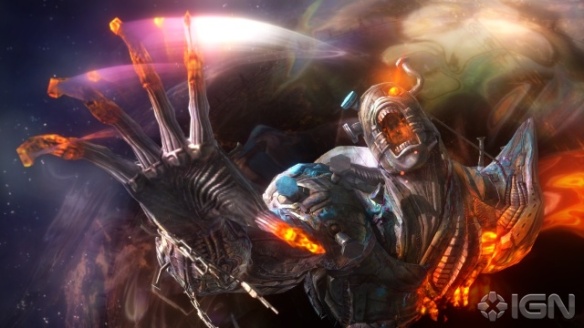I need to vent or I’m going to explode. Seriously.
Everyone knows that I love Final Fantasy. I LOVE FINAL FANTASY. The Dissidia games are a godsend to me: fanboy love that crams together a multitude of characters from every (main-series) game and allows them to kick each other in the teeth, hurl one another across the screen, and blast them into the next eon with a flashy light show.
But this game also drives me crazy.
 More Features Than a Swiss-Army Knife
More Features Than a Swiss-Army Knife
The Dissidia games boast what I consider to be one of the best examples of a polished, rewarding fighting engine: accessible, simple, and customizable. It’s accessible because it takes familiar faces and worlds and blends them together. It’s simple because characters perform attacks through the use of literally two buttons and the directional pad. They level up over time, giving you new abilities and skills that you can map to the controls to suit your play style. And there are dozens of characters for you to try until you find one (or ten, or twenty) you like. Everything about the game is customizable: skills and abilities, music, armor, weapons, accessories, summons, costumes. Freaking everything! It means that you make the experience your own. It also means that two players can use the same character in vastly different ways due to the sheer variety of skills and accessories to make you powerful. Seriously, Street Fighter is a garbage heap next to this game.
When it comes to context, Dissidia crams more into that little UMD than any game I’ve ever seen. On top of dozens of characters and environments, you have hundreds of weapons, armor, accessories and summon spells. You have plenty of music. You have over a dozen story campaigns (the last one is looooooooooooooooooooooooong), you have bonus modes, a playback option, a theater to review cutscenes, voice data and artwork. You can create your own quests and send them to friends. You have friend cards, and then you have multiplayer mode. Other fighting games have less than 20% of the features packed into Dissidia.
I LOVE Dissidia. LOVE LOVE LOVE! And I want nothing more than to tell everyone to play it.
But I can’t. Want to know why? Because the games are easily one of the most frustrating gaming experiences I’ve ever encountered. I focus the majority of my comments in this post around Dissidia Duodecim 012, but similar sentiments apply to the original Dissidia as well.
Intent to Kill
 (See how angry I look? Soon that’ll be you.)
(See how angry I look? Soon that’ll be you.)
I want to talk about cheap tactics. You know, that monster that appears in every fighting game to devour your patience and make you scream bloody murder? It’s a problem of AI programming. Developers love to give players a challenge, but rather than program AI that is *cough* clever, developers choose to make characters “challenging” by doing any other number of things: increasing range and damage are the most basic. But fighting games are awash with characters who have unblockable attacks, faster animations, unavoidable attacks, and a teleport ability. (I will marry the game designer who invents a fighting game without the use of a teleport ability.) Seth (Street Fighter IV) has all of those qualities. Shao Kahn (Mortal Kombat) has all but a teleport, just as a couple examples.
The developers of the Dissidia games go not one step further, but many. With a level cap of 100, they introduce enemies that are level 120 and up. Alternately, a level 90 character will have level 100 weapons and armor equipped. Or better yet, if your character has level 100 armor and your opponent a level 60 weapon, your opponent will continually do more damage to you in a single hit than you can to them.
Really, Dissidia? Your method for challenge is to break your own rules, which you yourself have imposed onto the game? Seriously, this is a bold new stage of laziness when it comes to game design. My characters can’t do that, so why can yours?
On the matter of AI programming, Dissidia “boasts” what is easily the toughest and most intelligent AI I’ve ever seen. The “computer” knows your strengths and weaknesses and will try to exploit them, as it should. Characters will kick your ass. And by “kick your ass”, I mean they will jump out of the game, pull you out of your chair, turn you around, kick you in the ass, and toss you from your 32nd story balcony. If that were the only issue, the game would be fine. But add to that those cheap tactics I just mentioned and you have a recipe for high blood pressure, stress, hair ripping, and sentences that utilize every swear word in the English language.
Motivation, Such an Aggravation
 “I’m gonna beat your face and look like a slut doing it! Teehee!“
“I’m gonna beat your face and look like a slut doing it! Teehee!“
I mentioned earlier that Dissidia is plentiful when it comes to content. It’s true: you’ll spend dozens of hours leveling up your characters and mastering their moves. You’ll spend another dozen hours obtaining items to make the best gear for that character. And after all of that work, guess what? The AI will *still* kick your ass. All of the evasions and dodges and accessories and attacks won’t help you: the programming in Dissidia is so unforgivably ruthless that playing the game can arguably become an exercise in self-inflicted torture. I’ve put over 70 hours into my game already (I still haven’t finished the main story), and I’m ready to toss the game literally to the wind. And I hate that feeling.
So why have I kept playing for so long? Because Dissidia peppers you with treasure chests, free gifts, and motivational messages as you play. It will actively encourage you to continue playing because the developers believe that the game is a fun experience. And it certainly can be! But for all of the work and effort that you put into it, Dissidia will find a way to prove that you’re still not good enough.
No game, ever, should motivate you into spending so much time and effort and then prevent you from simply completing the game. (Note: Dissidia does not “prevent” you from anything, but the indirect result of its programming is that many gamers will feel as though the game is intentionally keeping them from success.)
Endrant
Dissidia is, on many levels, what many fighting games should aspire to be: accessible, polished, and worth more than its price tag. On the flip side, Dissidia is also a game that should never be marketed to casual gamers. The Street Fighter crowd would love Dissidia because it requires such technical finesse that casual gamers will rarely be able to complete it.
And when I give up on a FF game, you know it’s a black, black day.



